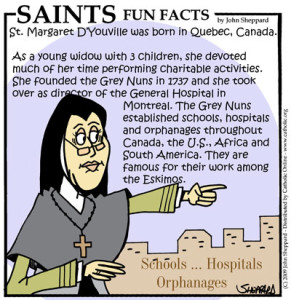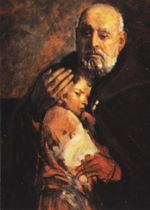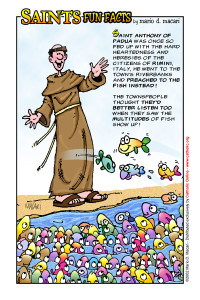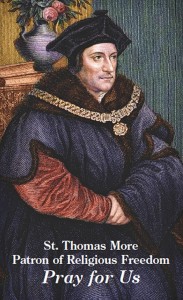
Saint Thomas More (1478-1535)
Image Courtesy: Thom Ryng
(Franciscan Media) Born in England London, Thomas was the son of a Judge. As a child, Thomas was sent to St. Anthony’s School according to EWTN where he attended until the age of 13 when he became the protege of Cardinal John Morton, Archbishop of Canterbury and Lord Chancellor, here Thomas’ merry character and brilliant intellect attracted the notice of the Archbishop, who sent him to Oxford where he entered at the age of 14 in 1492
While at Oxford, Thomas made friends with William Grocyn and Thomas Linacre, the latter becoming Thomas’s first instructor in Greek, Without ever becoming an exact scholar, Thomas mastered Greek “by an instinct of genius” as witnessed by Pace (De fructu qui ex doctrina percipitur, 1517) who adds, Thomas’ “eloquence is incomparable and twofold, he speaks with the same facility in Latin as in his own language.”
Besides the classics, Thomas studied French, History and Mathematics, he learned to play the flute and viol. After two years of residence at Oxford, Thomas was recalled to London and entered law school.
Despite Thomas More’s legal and political orientation according to Catholic News Agency he was uncertain in regard to the vocation that he should choose. Earlier in life, Thomas seriously considered joining the ‘Carthusian Monastic Order’ or the ‘Franciscans’ and followed a number of ascetic and spiritual practices throughout his life–such as fasting, abstinence and regular prayer.
In 1504 Thomas was elected to Parliament, he gave up his monastic ambitions–though not disciplined spiritual life, and became engaged, later marrying Jane Colt of Essex, they were very happily married for several years and were blessed by God with four children (Margaret, Elizabeth, Cecilia and a son John) however in 1511 Jane tragically died during childbirth. Following Jane’s death, Thomas later remarried a widow Alice Middleton, who was a very devoted wife and step-mother to Thomas’s children.
Two years earlier in 1509 King Henry VIII acceded to the throne. For years, the King showed a fondness for Thomas, working to further his career as a public servant. Thomas became part of King Henry VIII inner circle, eventually overseeing the English Court system as Lord Chancellor, More even wrote a book as ‘ghost writer’ in King Henry VIII name, defending Catholic doctrine against Martin Luther.
Thomas More’s eventual martyrdom would come as a consequence of King Henry VIII own tragic downfall. King Henry wanted an annulment to Catherine of Aragon, a marriage that Pope Clement VII declared to be valid and indissoluble. In 1532 Thomas resigned as Lord Chancellor refusing to support King Henry VIII efforts to defy Pope Clement and take control of the Church.
In 1534 King Henry VIII declared that every subject of the British Crown would be obligated to swear an oath affirming the validity of his new marriage to Anne Boleyn, refusing to do this would be regarded as Treason to the State.
In April of that same year, a Royal commission summoned Thomas More to force him to take the oath affirming the King’s marriage was valid, when Thomas could not accept the defiance of Pope Clement’s authority on the King’s new marriage, he was taken together with his wife Alice and their children and imprisoned in the Tower of London.
For a year and 3 months Thomas More’s wife and friends attempted to convince him to take the King’s oath and save his life–he refused. Subsequently an Act of Parliament went into effect that declared: King Henry VIII to be ‘the only supreme head on earth of the Church of England.’ Now, members of the Clergy in England were told that if they refused to execute King Henry VIII oath, they would be executed.
In June, Thomas was formally indicted for treason (as was earlier threatened) together with opposing King Henry VIII ‘Act of Supremacy’ in private conversations which Thomas More denied, after his trial he was sentenced to death.
Following Thomas More sentence, he wold argue that ‘King Henry VIII ‘Act of Supremacy’ was contrary to the Laws of God and His Holy Church–Thomas argued that “no temporal prince” could take away the prerogatives that only belong ed to Saint Peter and his successors according to the words of Jesus Christ.
When Thomas More was told that most of the English Bishops had accepted the King’s Order, More replied that the Saints in heaven did not accept it.
In July, 1535 Thomas More was taken before the Executioner to be beheaded. More in his final words said: “I die the King’s good servant but God’s first.”
After his execution, Thomas’s head was displayed on London Bridge but later returned to his daughter Margaret who preserved it as a Holy relic of her father.
Thomas More was Beatified in 1886 by Pope Leo XIII and Canonized in 1935 by Pope Pius XI
In 2000, Pope Saint John Paul II declared Saint Thomas More, ‘Patron of Political Leaders’ for as supreme diplomat and counselor, Saint Thomas More did not compromise his own moral values in order to please the king, knowing that true allegiance to authority is not blind acceptance of everything that authority wants.
Related: For Today’s Holy Scripture Readings for the Memorial of St. Thomas More, Visit: -USCCB
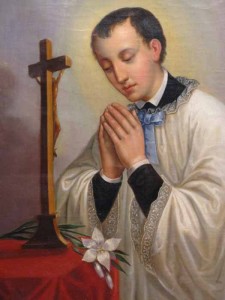
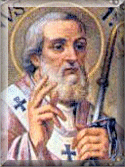
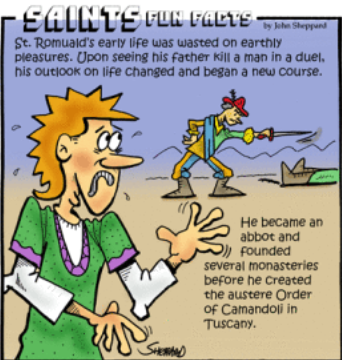
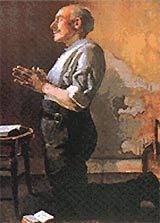
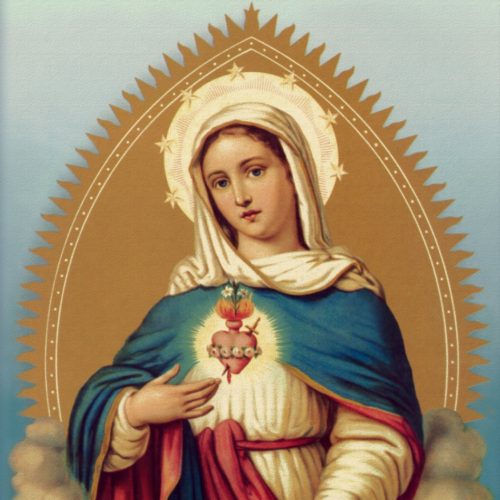 Blessed is the Virgin Mary who kept the Word of God and pondered it in her heart. –
Blessed is the Virgin Mary who kept the Word of God and pondered it in her heart. –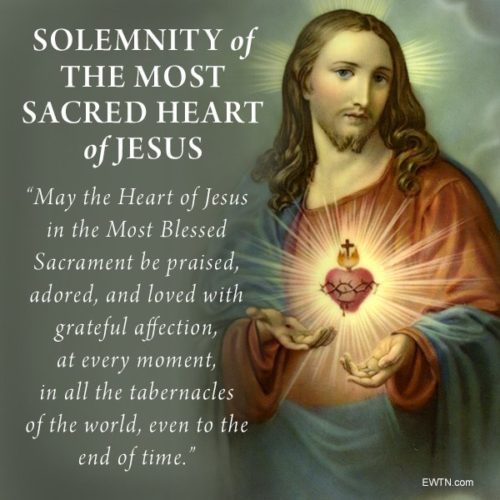 Jesus: “Take My yoke upon you and learn from Me;
Jesus: “Take My yoke upon you and learn from Me;